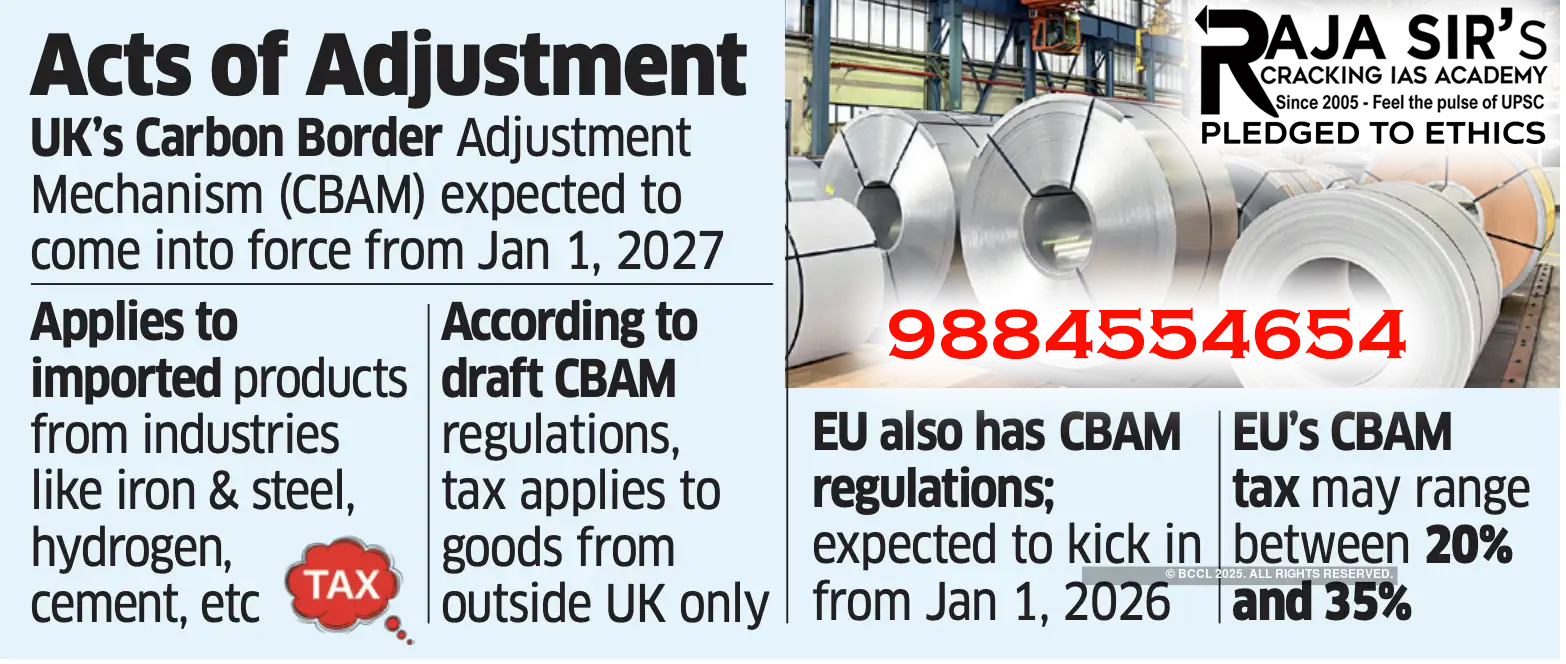- Home
- Prelims
- Mains
- Current Affairs
- Study Materials
- Test Series
India-EU Carbon Market Linkage: A Strategic Step Toward North-South Climate Cooperation
On September 17, 2025, India and the European Union (EU) announced a New Strategic Agenda with five pillars, including prosperity, sustainability, and global issues. A key highlight: the linkage of India’s Carbon Market (ICM) with the EU’s CBAM, allowing carbon prices paid in India to be deducted from CBAM levies at the EU border.
Opportunities for cooperation
- Access to Climate Finance and Technology: A rules-based international market allows developing countries in the Global South to attract significant climate finance from developed nations. This funding can be channelled toward renewable energy projects, energy efficiency upgrades, and other sustainable infrastructure. It also facilitates the transfer of advanced, low-carbon technologies.
- Mobilizing Investments for Green Projects: Developed countries with ambitious emission-reduction targets can purchase cost-effective carbon credits generated by projects in developing nations. For countries like India, this creates an additional revenue stream for green initiatives like afforestation, sustainable agriculture, and renewable energy development.
- Cost-Effective Mitigation: A global carbon market could lower the overall cost of climate action. According to the World Bank, Article 6 could cut the cost of achieving Nationally Determined Contributions (NDCs) by over 50%, potentially saving $250 billion annually by 2030.
- Enhanced Global Collaboration: As envisioned in Article 6.8, non-market-based cooperation can facilitate capacity-building, technology transfer, and knowledge sharing. This enables a broader range of climate collaboration beyond just carbon trading.

Challenges hindering cooperation
- Concerns over "Carbon Colonialism": Developing nations are wary of carbon projects that replicate exploitative power structures. Projects could displace local and indigenous communities, seize control over land, and result in unequal benefit-sharing, where developed nations benefit more than the host community.
- Risk of "Greenwashing": Developed nations and corporations could be tempted to buy cheap, low-quality carbon credits to offset their emissions rather than implementing genuine decarbonization efforts at home. This can undermine environmental integrity and delay systemic changes.
- Measurement and Verification Issues: Ensuring the credibility and integrity of carbon credits is a major challenge. Issues of double-counting, inflated baselines, and inadequate monitoring can compromise the environmental claims of carbon offset projects. This is especially true for sectors like forestry.
- Diverging National Interests: Persistent tensions exist between developed and developing nations regarding the design and rules of the international carbon market. Key areas of contention include:
- "Corresponding Adjustments": Rules governing how countries account for carbon credits transferred internationally to prevent double-counting.
- Flexibility and Transparency: The level of flexibility allowed in carbon market rules versus the need for transparent, robust accounting.
- Capacity Gap: Many developing nations lack the institutional capacity and technical expertise to effectively design, implement, and govern complex carbon pricing and trading mechanisms. This includes robust Monitoring, Reporting, and Verification (MRV) systems.
India''s position and way forward
India has been proactive in setting up its domestic Carbon Credit Trading Scheme (CCTS), aligning with its commitment to achieve Net Zero by 2070. For effective North-South cooperation, India''s path involves:
- Ensuring Market Integrity: Establishing robust and transparent MRV systems and ensuring the additionality and credibility of credits to prevent accusations of greenwashing.
- Integrating Domestic and International Markets: Linking India''s domestic carbon market with international mechanisms under Article 6 to attract foreign investment and increase market size.
- Balancing Development and Equity: Designing carbon market projects with strong safeguards to protect community land rights and ensure fair benefit-sharing for vulnerable groups, especially in forestry and agricultural projects.
- Promoting South-South Cooperation: Using the experience gained from its domestic market to foster collaboration and technology transfer among developing countries.
- Advocating for Fair Global Rules: Taking a leadership role in international climate negotiations (e.g., at COPs) to shape the global architecture of carbon markets, ensuring the rules are equitable and beneficial to developing nations.
The proposed linkage between India’s Carbon Market and the EU’s CBAM marks a pivotal moment in global climate cooperation. While it offers a pathway to harmonize trade and climate goals, its success hinges on India’s ability to build a credible, transparent, and resilient carbon pricing framework. For India, this is not just a trade adjustment—it’s a strategic opportunity to lead the Global South in shaping equitable climate governance. A well-negotiated and robust carbon market can transform India’s climate diplomacy from reactive to proactive, ensuring that sustainability becomes a lever for competitiveness rather than a constraint.









 Latest News
Latest News
 General Studies
General Studies